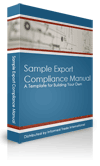13 Red Flag Indicators for Export Transactions
Exporters of military and dual-use goods are first and foremost business people, and sometimes have the habit of skipping over the crucial export compliance steps between making the sale and delivering the product to their buyer.
Most often the results of this practice are slowed delivery schedules, government fines, and even restrictions on future exports. The less tangible result, and one that I urge my customers to remember is the effect they might be having on the national security of the United States of America! With that in mind, here are a few red flag indicators you can keep in mind when dealing with overseas customers ordering controlled products:
13 Red Flag Indicators for Export Transactions
- The customer or its address is similar to one of the parties found on the Commerce Department’s [BIS’s] list of denied persons. Case example.
- The customer or purchasing agent is reluctant to offer information about the end-use of the item.
- The product’s capabilities do not fit the buyer’s line of business, such as an order for sophisticated computers for a small bakery.
- The item ordered is incompatible with the technical level of the country to which it is being shipped, such as semiconductor manufacturing equipment being shipped to a country that has no electronics industry.
- The customer is willing to pay cash for a very expensive item when the terms of sale would normally call for financing.
- The customer has little or no business background.
- The customer is unfamiliar with the product’s performance characteristics but still wants the product.
- Routine installation, training, or maintenance services are declined by the customer.
- Delivery dates are vague, or deliveries are planned for out of the way destinations.
- A freight forwarding firm is listed as the product’s final destination.
- The shipping route is abnormal for the product and destination.
- Packaging is inconsistent with the stated method of shipment or destination.
- When questioned, the buyer is evasive and especially unclear about whether the purchased product is for domestic use, for export, or for reexport.
If you have reason to believe a violation is taking place or has occurred, you may report it to the Department of Commerce by calling its 24 hour hot line number: 1 (800) 424-2980.
Posted on September 26th, 2007 by keeton
Filed under: EAR, ITAR

